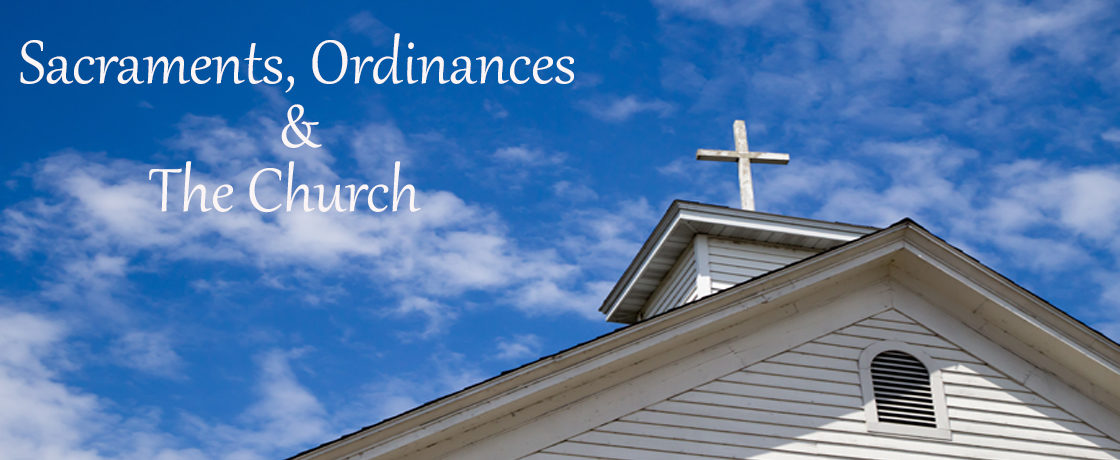Sacraments, Ordinances & The Church
Sacraments, Ordinances & The Church
The greatest controversy in the history of the church took place in the sixteenth century between the Roman Catholic Church and the Protestant Reformers over the question of how justification takes place. The issue was whether a person can be made right with God by faith in Jesus alone or by some other means.
Elements of that controversy still remain to this day: “How can a sinful person get back into the right relationship with a Holy God?”
Is it just simple faith in Jesus, or is it Jesus plus something else? We have so eliminated the last judgment from our theology and expunged any notion of divine punishment or of hell from our thinking (and from the church’s thinking) that it is now widely assumed that all a person must do to get to heaven is to die.
A major error that produces false assurance of salvation for an individual is called sacerdotalism. This is the view that salvation is accomplished through the priesthood, through the sacraments, and or through the church. People point to baptism, to the Lord’s Supper, or to other religious rites and say, “I’ve had these sacraments, which are means of grace,” so they draw a faulty assurance from having experienced these sacraments. This was also the very error the Pharisees committed in biblical days. They depended on external rites to guarantee them a place in the kingdom of God.
Sacraments & Ordinances
A Sacrament is a religious rite regarded as a visible expression of the mystery of the gospel. It is usually
understood as distinct from the concept of “ordinance” in that the act of the sacrament itself is often considered to be a vehicle or means of grace. The term. therefore, is especially commonly used in those religious bodies that believe religious rites play a part in salvation.
The sacraments are very important. They communicate the promises of God to us for our salvation and they help communicate God’s grace that helps us in our Christian lives. But the sacraments have never saved anyone, and anyone who puts his or her trust in the sacraments has a false assurance of salvation, because he or she is trusting in something that neither saves nor can save.
An Ordinance is a ceremony which the Lord commanded that His church should observe, and in which the gospel is portrayed. An ordinance is practiced as a memorial act of obedience, rather than as a sacrament.
One of the most critical problems in a false assurance of salvation is an inaccurate understanding of the
requirements of salvation. Bad theology can produce false assurance, and good theology leads to true assurance. The Reformation recognized only baptism and the Lord’s Supper as valid ordinances or sacraments, and even how they understood their effects was different.
The Ordinance of Baptism
Before the Reformation, the early Fathers regarded baptism as the rite of initiation into the Church, and usually considered it as closely connected with the forgiveness of sins and the communication of the new life.
The Lutheran Reformation did not entirely rid itself of the Roman Catholic conception of the sacraments concerning baptism. However, the Anabaptists denied the legitimacy of infant baptism. (not to be confused with infant dedication) They insisted on baptizing all, even if they had already
received the sacrament before, in infancy.
Biblical Baptism
Baptism was instituted by Christ after He had finished the work of reconciliation and had received the approval of the Father in the resurrection. “Go ye therefore and make disciples of all nations, baptizing them in the name of the Father and of the Son and of the Holy Spirit: teaching them to observe whatsoever I have commanded you.” Matthew 28:19—20
They who accepted Christ by faith were to be baptized in the name of the triune God, as a sign and seal of the fact that they had entered into a new relation to God and as such were obliged to live according to the laws of the Kingdom of God.
The Ordinance of the Lord’s Supper
During and after the Reformation, the Reformers rejected the sacrificial theory of the Lord’s Supper, and the medieval doctrine of transubstantiation. They differed, however, in their positive construction of the Scriptural doctrine of the Lord’s Supper.
The prevailing view in Protestant Churches is that the Lord’s Supper is not a provider of grace itself, but merely an instrument in the hand of God. Its effective operation is dependent not only on the presence, but on the activity of faith in the recipient.
The Lord’s Supper is a symbolical representation of the Lord’s death. 1 Corinthians 11:26. The central fact of redemption, prefigured in the sacrifices of the Old Testament, is clearly set forth by means of the significant symbols of the New Testament ordinance. The words of the institution, “broken for you” and “shed for many.” point to the fact that the death of Christ is a sacrificial one. It was for the benefit, and even in the place, of His people.

